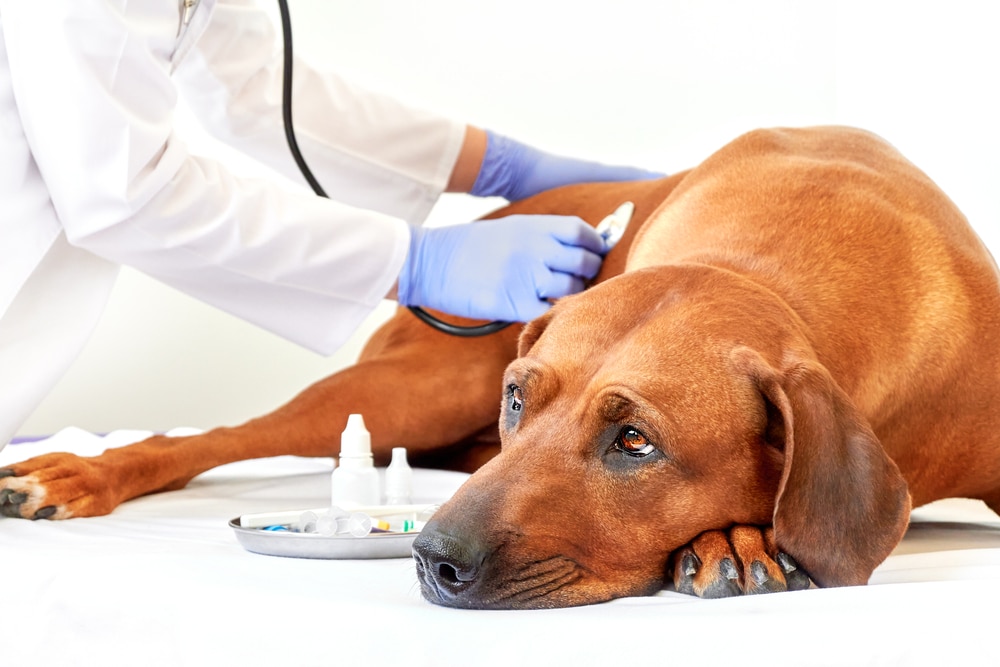While heart disease is extremely common among humans, many owners do not know that dogs are very susceptible to heart disease as well. Moreover, many dogs will suffer from degeneration of their heart valves or abnormalities of the cardiac muscle as they age. As a result, this article will discuss the most common dog heart disease symptoms and treatments.
Dog heart disease symptoms include labored breathing, exercise intolerance, coughing, abnormal heart rhythms, abdominal fluid, and sometimes collapse. So, dog heart disease treatments include diuretics, medication to help contractility of the heart, and medication to control arrhythmias.
Table of Contents
Types of Heart Disease in Dogs

Heart disease in dogs is more common than we typically imagine and is often separated into two groupings – valvular disease or heart muscle disease. Moreover, 1 in 10 dogs will experience heart disease over their lifetime, with 80% of those dogs suffering from mitral valve disease. Also, other common forms of heart disease include dilated cardiomyopathy (DCM), pulmonic stenosis, aortic stenosis, or tricuspid valve dysplasia.
Mitral valve disease is the most common heart disease that affects small breed dogs. This is a disease where the valves of the heart degenerate. Conversely, large breed dogs are much more predisposed to dilated cardiomyopathy. This is an acquired or heredity disease of the heart muscle that causes the heart to stretch and not function appropriately. Both of these diseases cause progressive enlargement of the heart and the potential for dogs to develop life-threatening heart failure or arrhythmias.
Dog Heart Disease Symptoms
Regardless of the cause of heart disease, there are often symptoms that can help lead to the diagnosis. During the early stages of heart disease, some dogs may not have any signs at all. Also, symptoms begin to develop as heart disease progresses. The most common symptoms of dog heart disease include exercise intolerance, coughing, difficulty breathing, fainting or collapsing, abnormal heart rhythms, and abdominal fluid.
Exercise Intolerance
As the heart begins to fail as a pump, it cannot provide effective perfusion to the rest of the body. This leads to the inability to oxygenate properly, especially during exercise. Dogs may demonstrate weakness or reluctance during walks or play.
Coughing
Enlarged hearts can cause compression of the trachea or lower airways. This can lead to the development of coughing due to airway collapse.
Difficulty Breathing
As the left side of the heart becomes more diseased, this can cause poor blood flow out of the heart leading to fluid build-up in the lungs. This is a life-threatening condition called congestive heart failure.
Fainting or Collapse
When the heart cannot meet the oxygenation demands of the body, patients may collapse or lose consciousness. Syncope is the name of these episodes.
Abnormal heart rhythms
With progressive heart disease, the electrical currents within the heart are not conducted normally or effectively. This can lead to arrhythmias or abnormal electrical activity of the heart, which can potentially be life-threatening. The most common arrhythmia in dogs with heart disease is atrial fibrillation.
Abdominal fluid
When the right side of the heart becomes diseased, fluid will back up into the abdomen leading to a condition called ascites.
Diagnosis of Dog Heart Disease
The gold standard diagnosis of heart disease in dogs is a cardiac ultrasound performed by a veterinary cardiologist. This is called an echocardiogram. Most important, this test is non-invasive and allows the cardiologist to characterize the heart disease and its severity.
Supplementary Tests For Dog Heart Disease
There are two supplementary tests for dog heart disease. They are an electrocardiogram and chest X-rays.
Electrocardiogram
This allows the evaluation of any abnormal electrical activity of the heart that may necessitate treatment.
Chest X-rays
This diagnostic can be performed by a general practitioner and allows the veterinarian to assess the heart size and shape. This diagnostic is also used to determine if pulmonary edema/congestive heart failure is present.
Dog Heart Disease Treatments
The treatment of heart disease in dogs is primarily with medical management alongside supplements and diet changes. Your veterinarian or veterinary cardiologist will help formulate a treatment regimen that is appropriate for your dog’s underlying diagnosis. This treatment may include pimobendan, diuretics, ACE inhibitors, and anti-arrhythmic medications, for example.
Pimobendan
This medication works to improve cardiac function and contractility of the heart. This medication can also delay the progression of heart disease for dogs with mitral valve disease.
Diuretics
These drugs work to remove excess fluid from the body. They deter or treat the formation of pulmonary edema. Examples of these drugs include furosemide and spironolactone.
ACE inhibitors
These medications work by helping to lower blood pressure, and they also inhibit the negative secondary side effects of heart disease. The two most common drugs used are Benazepril and Enalapril.
Anti-arrhythmics
These medications treat any abnormal electrical activity of the heart. Digoxin, diltiazem, or atenolol are common types of anti-arrhythmic drugs.
Longevity of Dogs with Heart Disease
Heart disease in dogs is often progressive and may shorten their life expectancy. Dogs with DCM generally will live 1-2 years beyond their diagnosis. Dogs with mitral valve disease can live three years or longer after initial diagnosis. After congestive heart failure has set in, many dogs will not live longer than a year. Fortunately, dogs do not know that they have heart disease and many can have a great quality of life.
In Conclusion: Dog Heart Disease Symptoms and Treatments
In conclusion, dogs are predisposed to heart disease similar to humans. Luckily, many of these diseases are easily diagnosed and manageable. So, if your dog has heart disease, work closely with your veterinarian to monitor its symptoms and come up with a treatment plan to offer your dog the best quality of life possible.
So, is everything okay with your dog? Also, what’s got you curious about dog heart disease symptoms and treatments? Let us know your thoughts and why in the comments below.
